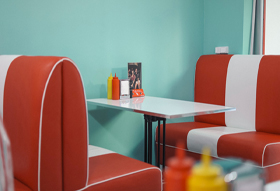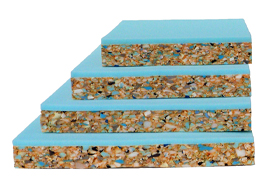
Bar & Restaurant seating foam
Choose the right foam for your bar, cafe and restaurant seating

Comfort and style is a huge factor in bars and restaurants, with chairs and seating being a key component when it comes to designing a practical and fashionable hospitality environment. Yet as soft furnishings in such establishments are in constant use, it is sometimes difficult to find a comfortable yet resilient seating solution.
Foam has been used by the hospitality sector for many decades. In old bar stools and standalone dining chairs, it is not uncommon to find a thin sheet of poor polyurethane foam topped with a soft fibre filling. Although initially comfortable and springy, it is not long before such foam begins to sag and fibre fillings become lumpy. This is why it is so important for hospitality establishments to properly determine their seating solutions and to invest in high-quality foam components. Against popular belief, re-kitting out your bar or restaurant seating need not break the bank.
For bar seating in particular, we frequently recommend the use of reconstituted chip foam pads which are of incredibly high density. These are typically topped with a high-density foam topper for additional comfort. For bar stools, eFoam is the UK’s leading supplier of pre-cut and cut to size chip foam, with our pre-cut bar seat foam pads measuring a total of 2.5” in depth – consisting of 6lb of reconstituted chipped foam at 2” in thickness, and a 0.5” high-density topper. The durability of this combination makes it most suitable for bar seating that is in constant use. We supply this foam in a range of square and cylinder shapes to suit all needs.

For restaurant-type seating, such as standalone dining chairs, sofas and padded booth units, reconstituted chip foam can be used. However, to achieve a softer feel, it is worth considering different types of foam that can be layered upon one another to create your desired firmness. For example, if you have a deep padded sofa or booth unit bench, very high-density polyurethane can be used to fill the majority of the cushion. This can then be topped with a medium density foam and/or a memory foam sheet per your specified requirements.
Furthermore, some bars and restaurants also have outdoor seating, and depending on whether this is partially undercover or not, you may need to consider a foam suitable for outdoor exposure. For example, a material commonly used is Plastazote Superior closed-cell foam as its water resistant, weather resistant and non-absorbent properties ensure it can withstand the elements. Standard closed-cell polyurethane foam can be used as this is resistant to mould, mildew and bacteria, but Plastazote is often both preferred and praised for its practical fast drying qualities.

Unlike both natural and synthetic fibre-based materials, foam is a better material for public seating applications. This is because it’s easy to clean and its antibacterial qualities make it the most hygienic solution. Depending on the foam type you select, some foams are inherently waterproof, although you may not require this as many bar and restaurant seats are covered with leather or other splash proof material.
Should you have any queries regarding your own seating needs or specifications whether trade or non-commercial, please contact our knowledgeable advisors. No job is too big, small, or too complex!

